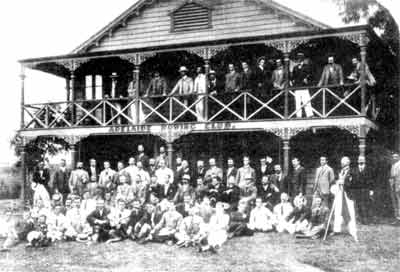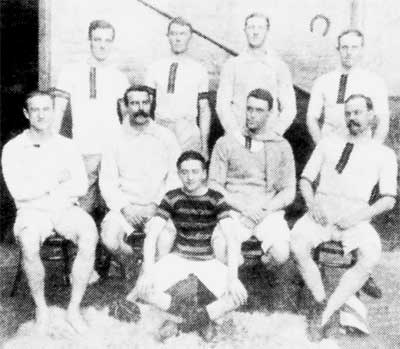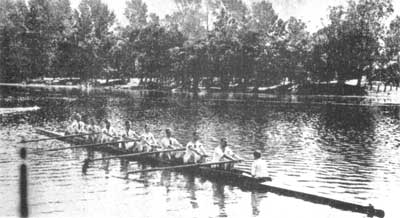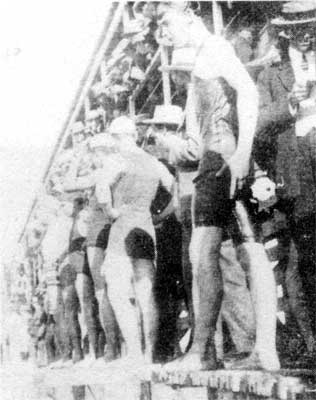Adelaide Rowing Club - The First Hundred Years
A Narrative History 1882-1982 - Compiled by R W Richardson
Table of Contents
Chapters
- Introduction
- I Zingari: The Origin of the Club
- Narrative History of ARC: 1882-1887
- 1887-1892
- 1892-1897
- 1897-1902
- 1902-1907
- 1907-1912
- 1912-1922
- 1922-1927
- 1927-1932
- 1932-1937
- 1937-1942
- 1942-1947
- 1947-1952
- 1952-1957
- 1957-1962
- 1962-1967
- 1967-1972
- 1972-1977
- 1977-1982
- Early Days of Rowing on the Murray
- Memoirs of my Association with the ARC and Rowing Men
- ARC's Famous Coxswains Over the Years
- Get Fit for Autumn—How to do it
- Notable ARC Coaches
- ARC at War
- Pity the Poor Hon. Secretary!
Appendices
7. Narrative History of the Adelaide Rowing Club - 1902-1907
Season 1902-03
Not much rain had fallen during the latter part of the winter, and the level of the water in the Torrens was very slow to build up after the annual release to scour out the channel.
Rowers were complaining and so were the farmers down at the reedbeds because there was no water for their market gardens or their pastures. The rowers wanted water dammed and the farmers wanted it released. Editorials described the condition of the lake as "Parlous".

1902 Group in front of the Clubhouse
A.R.C. Success At Rowing
But the S.A.R.A. managed to put on a Summer Regatta in mid-December, and Adelaides had five good wins, the two Senior fours contests and three Maiden fours.
Later in the season, at the Port, by building on the successful four stroked by Grayson, they moulded a formidable 8 by adding Porter, Richardson, Anderson and Fotheringham, and won Champion 8's, and two weeks later, Champion 4's.

1903 Champion Eight

The Champion Eight - The Adelaides
Training At The Port
As soon as the Committee decided that the Club would contest Champion 8's and 4's, and a crew was picked, the serious business of training at the Port began.
It entailed a lot of sacrifice and hard work on the part of the coach, cox and crew alike, because it involved the whole crew taking lodgings at Port Adelaide for the duration of training and travelling by rail to and from work in Adelaide during the day, there being no motor cars in those days.
The expenses of the coach and the coxswain were borne by the Club, and the crew members who could afford it, paid their own, but any who found it strained their finances were helped as necessary.
Season 1902-03
Not much rain had fallen during the latter part of the winter, and the level of the water in the Torrens was very slow to build up after the annual release to scour out the channel.
Rowers were complaining and so were the farmers down at the reedbeds because there was no water for their market gardens or their pastures. The rowers wanted water dammed and the farmers wanted it released. Editorials described the condition of the lake as "Parlous".
A.R.C. Success At Rowing
But the S.A.R.A. managed to put on a Summer Regatta in mid-December, and Adelaides had five good wins, the two Senior fours contests and three Maiden fours.
Later in the season, at the Port, by building on the successful four stroked by Grayson, they moulded a formidable 8 by adding Porter, Richardson, Anderson and Fotheringham, and won Champion 8's, and two weeks later, Champion 4's.
Training At The Port
As soon as the Committee decided that the Club would contest Champion 8's and 4's, and a crew was picked, the serious business of training at the Port began.
It entailed a lot of sacrifice and hard work on the part of the coach, cox and crew alike, because it involved the whole crew taking lodgings at Port Adelaide for the duration of training and travelling by rail to and from work in Adelaide during the day, there being no motor cars in those days.
The expenses of the coach and the coxswain were borne by the Club, and the crew members who could afford it, paid their own, but any who found it strained their finances were helped as necessary.
The shed where the boats were kept was at Birkenhead, accessible only by ferry, and very primitive by present standards, draughty, and the only lighting was by lantern.
After a long row in March, it would be dark by the time the crew got back, bare feet in the mud, lifting the boat up the bank and onto the gloomy racks inside, no water laid on, so they would have to put some warm things over their rowing togs, wait for the ferry, have a shower (probably cold) before changing and finally sit down to "tea".
The first week they would be suffering from chafed behinds and blistered hands and getting used to unfamiliar beds and pub meals. But it became routine after a while, and was first class for building character.
It must have been sheer bliss to come up to the Torrens at the weekend and row in a club regatta from the Weir to Long's Point.
Two New Club Functions
Exciting changes in the Club routine of annual fixtures took place this season, and a unique honour was paid to the Adelaide Rowing Club by asking that the Champion 8 represent the State in the Interstate contest to be held at Melbourne.
The first change was the decision to hold the Swimming Races at the Glenelg Baths instead of the City Baths, on a Saturday afternoon, instead of the evening.

Swimming Races at Glenelg Baths, 1906
Not many people today remember the old Glenelg Baths. They were a wooden pile structure built to enclose a rectangle of the sea, with staff and changing accommodation on a jetty-like structure on three sides of the rectangle, well above highwater level, and platforms below at various levels.
One of the problems of organizing swimming and particularly diving at Glenelg was to choose a Saturday afternoon in summer when the tide was in, otherwise there was not depth enough to swim more than 2 lanes, and diving was not permitted.
Everyone had to make the 7 mile journey by train or ride a bike, and rough weather tended to spoil the spectacle.
The instigator of the change was P.H. Upton who won the Club Championship race, and also the Club Handicap off the scratch mark, but was he the same man, Henry Upton, who was Captain way back in 1885, when Adelaide Rowing Club emerged from "I Zingari"? I very much doubt it, but he was probably a close relation.
The second innovation was the Christmas Morning Reunion. It was an instant success and Joe Sharp, who organized it, set the pattern that has been repeated in modified form, ever since.
The honour of representing South Australia in the Interstate 8's to be rowed on the Yarra was accepted with delight by the Club, and circulars were sent out to members to donate the crew's expenses. So much came in, that there was money over after all the accounts were paid. The crew was H.H. Mildred, bow, F.W. Porter, 2, R.F. Richardson, 3, R.A. Anderson, 4, M.A. Fotheringham, 5, D. Blyth, 6, J.H. Gosse, 7, A.J. Grayson, stroke, V. Smith, cox, Arthur Nicholls, coach.
By coming third, and beating New South Wales and Western Australia, the crew were justifiably pleased with their performance in such talented company, and reported having received an enthusiastic reception from officials, clubs and the public in Melbourne.
Second Extension To Boathouse
With money in the bank, and a new racing 8 from Edwards crowding the boatshed, the Committee consulted with Quinton Bruce who produced a plan and estimated extensions would cost £180.
This would mean a return to an overdraft at the bank, and a new call for guarantors, especially as the account for the 8 would have to be met.
So a Club Ball was proposed to raise some money, and a contract was signed for the additions to be built during the winter months.
Johnsons, the Brewers of Oakbank, donated a cask of Pikes ale to the Club, J.Q. Bruce gave £5-0-0 and the ball raised £I5-0-0; so once again the Club began pegging back an overdraft of £230-0-0.
